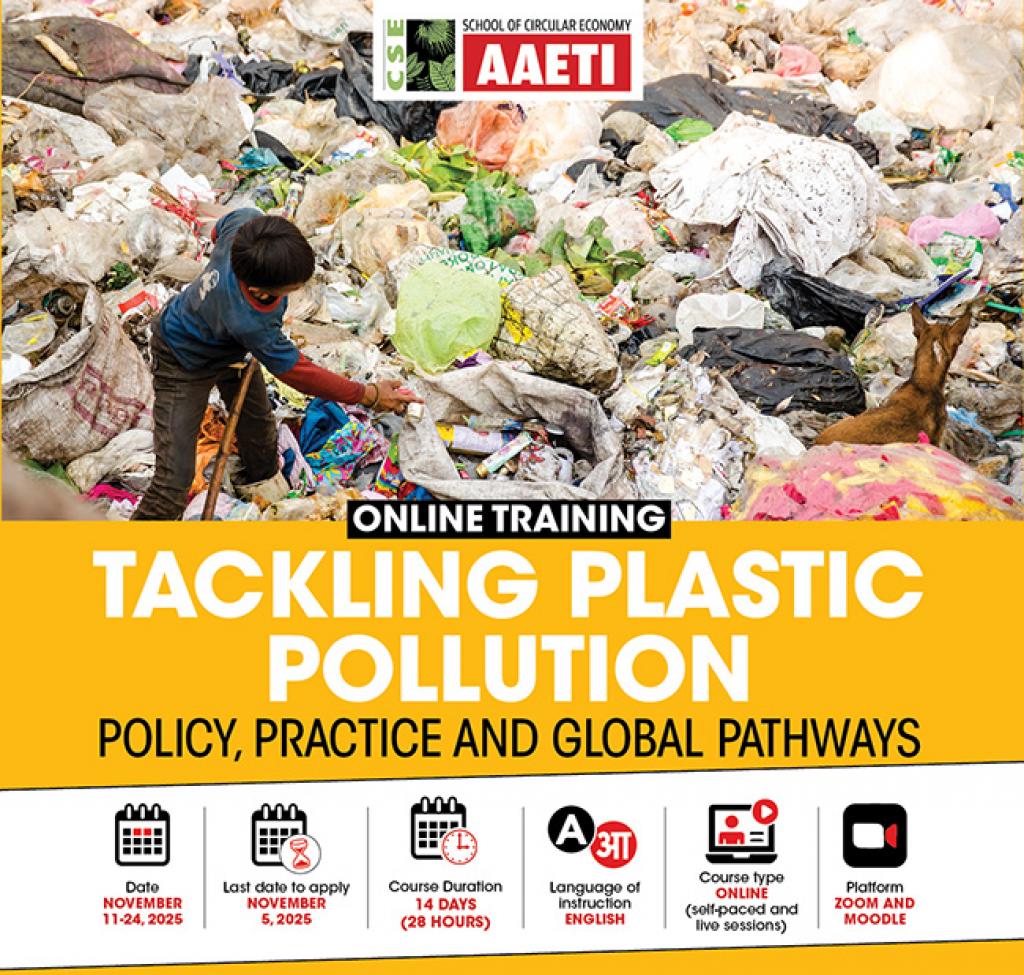Online Training: Tackling Plastic Pollution
Registration Closed
Plastics are deeply embedded in every aspect of our daily lives.The world produces nearly 450 million tonne(MT) of plastic waste every year. Only 9 per cent of this is recycled; the rest is landfilled, incinerated or mismanaged. Since the 1950s, over eight billion tonne of plastics have been produced, of which, more than 90 per cent remain discarded in the environment.
An estimated 38 kg of plastics enter the oceans every second, with 75-199 MT already afloat, making up over 80 per cent of the total marine pollution. Without systemic changes in production, consumption and disposal, plastic waste entering aquatic ecosystems could triple to 23-37 MT per year by 2040, endangering ecosystems, economies, and human health.
The Global South bears a disproportionate burden of this crisis. Rapid urbanisation, dense populations and weak waste management systems heighten vulnerability; but they also offer a chance to leapfrog towards circular and equitable systems that prioritise reduce, reuse and redesign.
The momentum for change is growing: Over 190 countries are now negotiating a Global Plastics Treaty under the United Nations to create a legally binding framework for the entire plastics life cycle. For developing nations, these talks offer a chance to embed equity, finance and technology transfer in global solutions. Without decisive action, plastic production and waste could rise by 70 per cent by 2040, undermining climate and sustainability goals.
At this defining moment, there is a pressing need for professionals who can translate policy into practice linking local action with global commitments.To meet this need, Centre for Science and Environment (CSE) has launched a Global Online Certificate Course on ‘Tackling Plastic Pollution: Policy, Practice and Global Pathways’. The course will connect practitioners, policymakers, civil society and industry experts to explore pathways for circular, inclusive and resilient plastic economies across the Global South.
COURSE THEMES
- The need for a ban on single-use plastics and India’s policy experience
- Plastic waste value chain – from generation to recycling
- Extended Producer Responsibility (EPR): Concepts, challenges and implementation models
- Reducing, reusing and redesigning plastics for a circular future
- Towards a Global Plastics Treaty: Key negotiating points, country positions and what it means for the Global South
- Innovations and best practices from India, Africa, Southeast Asia and Latin America
- Integrating the informal sector in the plastic circular economy
- Financing plastic waste management: Role of markets, credits and EPR trading
WHO SHOULD JOIN
- Officials from government departments and local authorities
- Waste management practitioners and environmental regulators
- Academicians, researchers and students
- NGOs, civil society organisations and think tanks
- Private sector representatives, recyclers and producer responsibility organisations (PROs)
- Consultants, start-ups and sustainability professionals
COURSE HIGHLIGHTS
- Live interactive sessions with global and regional experts
- Case studies from India, Africa, and Southeast Asia
- Practical tools and policy templates for implementation
- Access to course materials and knowledge resources
- Certificate of Completion (upon successful completion of assessment)
Course Coordinator:
Dr TRIBHUWAN SINGH BISHT
Deputy Programme Manager
Solid Waste Management and Circular Economy, CSE
tribhuwan.bisht@cseindia.org
+91 7678294666
| Flyer | |
 |
|
| Download flyer | |
| Course Fees | |
|
|
| Who Should Join | |
|
Share this article